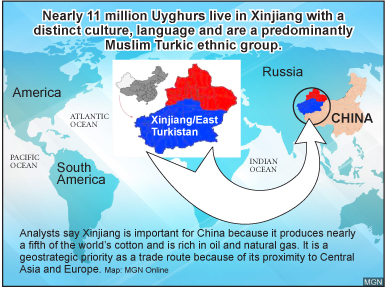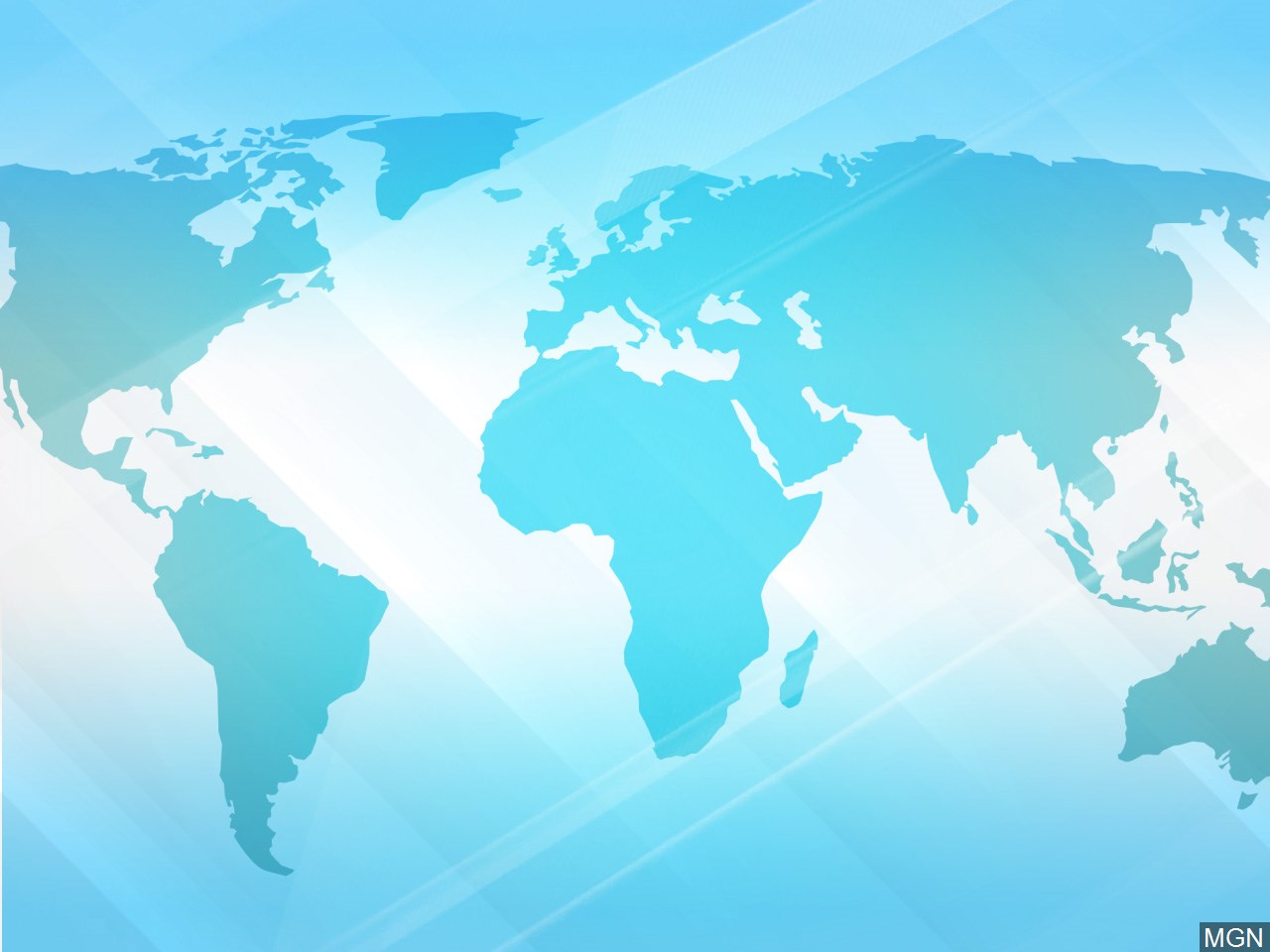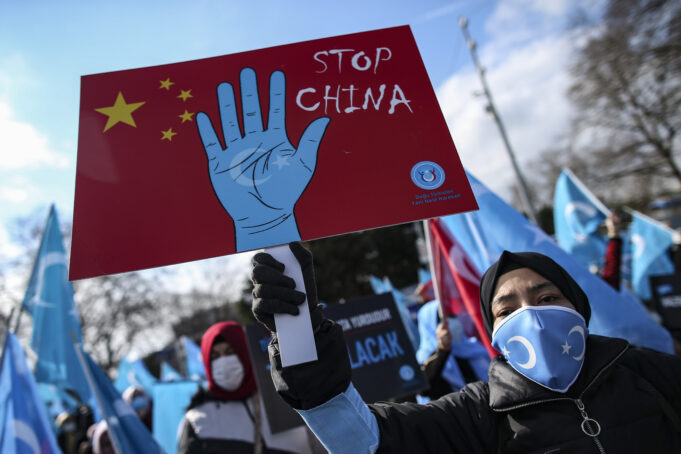The Peoples Republic of China continues to be blasted by the international community, human rights defenders and a plethora of voices accusing the regime of genocidal practices, ethnic cleansing and crackdowns of Uyghur Muslims and other minority ethnic groups in its northwest Xinjiang province.
Nearly 11 million Uyghurs live in Xinjiang with a distinct culture, language and are a predominantly Muslim Turkic ethnic group.
According to rights groups, China is imposing forced labor, cultural re-indoctrination, and alleged sterilization of Uyghur women, which the government of China denies.
“We refer to what’s happening as modern-day slavery,” said Julie Millsap, director of public affairs for the Campaign for Uyghurs, an advocacy group.

“Essentially what you have going on is that Uyghurs are in this political environment right now where they have no freedom to speak to journalists … relatives or anyone outside of China,” she told The Final Call.
China is the top rival to the United States for global influence and economic power. It is second to America as the largest world economy.
Analysts say Xinjiang is important for China because it produces nearly a fifth of the world’s cotton and is rich in oil and natural gas. It is a geostrategic priority as a trade route because of its proximity to Central Asia and Europe.
There is a demand that multinational companies, including famous global brands, scrutinize their supply chains and even curb business with China.
Uyghurs have allegedly been forcibly employed in low-skilled, labor-intensive industries, like agribusiness, textiles, garment, automotive and technological sectors.
Advocates told The Final Call that Uyghurs are routinely subjected to exploitative working and living conditions that may constitute arbitrary detention, human trafficking, and enslavement by means of forced labor.

“There are also widespread instances of labor transfers where Uyghurs are taken from their hometown … en mass into factories throughout the Uyghur region and now … in China proper,” said Ms. Millsap.
She said her organization has seen satellite imagery of people being moved from what the Chinese officials say are “re-education facilities” that Ms. Millsap said are regime run concentration camps.
In a March 29 statement, the United Nations Working Group on Business and Human Rights expressed concern over reports about alleged detention and forced labor of Muslim Uyghurs. The experts said they received information that connected over 150 Chinese and foreign companies to serious abuse allegations.
“Businesses must not turn a blind eye to this and must conduct meaningful human rights due diligence in line with the UN Guiding Principles,” said Surya Deva, vice chairperson of the Working Group. The group is calling for “unhindered access” to conduct a fact-finding mission to China.
China maintains the allegations are “fabricated” and said the Working Group “maliciously criticized China” based on “rumors and disinformation” generated by anti-China forces with political bias.

“China firmly opposes and categorically rejects the accusations,” said Foreign Affairs Spokesperson Hua Chunying during a March 30 briefing.
Ms. Chunying argued the Working Group and others insist on making accusations, but “where is the alleged overwhelming evidence?”
“Since 2012, the Xinjiang project site has performed second-party credibility audits and third-party verifications … and has never found a single case related to incidents of forced labor,” she insisted.
For professional auditing companies to claim they did not find violations is impossible, said Ms. Millsap.
“These companies that are being confronted on this issue know very well that there is not a political environment where there is any level of transparency,” she said. “There is no ability to conduct due diligence in the region.”
The Council on American-Islamic Relations (CAIR) also condemns the “genocide targeting” of Uyghurs and other ethnic minorities, said Robert McCaw, the group’s government affairs director.
He told The Final Call more needs happen such as Congress passing the Uyghur Forced Labor Prevention Act which would ensure American corporations are not funding forced labor.
“We also think it’s incumbent upon the United States to pull out of the 2022 Olympics in China,” Mr. McCaw said.
Washington is noncommittal on boycotting the Winter games scheduled for Beijing in February 2022.
“We’re not there yet … we’re not focused on a boycott. What we are focused on is talking, consulting closely with our allies and partners,” said U.S. Secretary of State Antony Blinken in April 12 remarks on “Meet the Press.”
In a multilateral move in March, the US, UK, and Canada joined the European Union in placing sanctions on Chinese officials and entities they deemed involved in genocidal practices against Uyghurs and other Turkic people in Xinjiang.
The targeting of companies and individuals is widely seen by activists as positive.
Earlier this year America, Canada and the Netherlands officially designated China’s alleged atrocities against Uyghurs and other Turkic peoples as genocide.
The U.S. State Department annual Country Reports on Human Rights Practices for 2020 released in late March characterized the situation as “genocide and crimes against humanity.”
“We (CAIR) recently welcomed the Biden administration’s labelling of the Chinese internments, torture and murder of Uyghur Muslims and population replacement programs as genocide,” said Mr. McCaw.
A bipartisan resolution was introduced in Congress on April 14 pushing the Biden administration to refer the Uyghur matter to the United Nations. Lawmakers are calling for an investigation under the Convention on the Prevention and Punishment of the Crime of Genocide, and multilateral sanctions against China at the UN Security Council.
“China’s human rights violations against the Uyghur community in Xinjiang are beyond the pale,” said Gregory Meeks (D-N.Y.), House Foreign Affairs Committee chairman, in a joint statement. “The international community needs to stand together and condemn the horrific treatment of China’s ethnic minorities, who have undergone mass detention and seen their way of life threatened,” added Rep. Meeks.
China rebuked the U.S. and foreign nations, accusing them of meddling in internal affairs. It said crackdowns involving Uyghurs were part of counter-terrorism measures in response to an insurgency in the Xinjiang region. China claims since the 1990s radicalized Uyghur militants have waged an independence struggle using violence, sabotage, and civil unrest.
An autonomous region of China since 1949, even the name Xinjiang is disputed. The area is also known as East Turkistan and borders nine nations—Mongolia, Russia, Kazakhstan, Kyrgyzstan, Tajikistan, Afghanistan, Pakistan, India, and Tibet.
While global appeals are being made to end rights abuses against Uyghur Muslims, information distributed by Australian Alert Service, a weekly publication of the Australian Citizens Party, raised questions. The party accused some Uyghur rights groups as being pawns of a U.S. anti-China agenda.
The 40-page document, “Xinjiang: China’s Western Frontier in the Heart of Eurasia,” was an eight-article series published between November 2020 and March 2021. It said since 2004, the U.S.-based National Endowment for Democracy gave $8.76 million to activist groups lobbying against China. All “publicly identified recipients are Uygur diaspora groups,” said the articles.
The Final Call raised the concern with Julie Millsap of the Campaign for Uyghurs. “That actually started with state media,” Ms. Millsap said. “We do receive a grant from the NED, we’re not ashamed of that, we’re not hiding it,” she said. It is not the group’s only source of funding, and support of democratic freedoms for Uyghurs doesn’t mean donors are involved on a political level, Ms. Milsap added.
“We believe that people should have the right to self-determination,” she explained. Ms. Millsap said also the organization does not take its cues from the U.S. government.
Washington’s involvement is the result of “years and years of activists fighting and raising the issue to even bring it to the attention of the U.S. government,” she continued.
As a Muslim, Mr. McCaw says there must be more attention on the Uyghur question from the Muslim world.
“It is utterly disappointing to see Muslim international organizations like the Organization of Islamic Cooperation … turn a blind eye to China’s genocide, in favor of maintaining trade relations,” Mr. McCaw said.
American Muslim, and Muslim civil society groups internationally are leading the campaign against China’s genocide. “And our voices will not be stifled,” vowed Mr. McCaw.
Many public officials and governments not condemning Uyghur persecution are driven by economic, trade and business interests.
“The lives of Uyghurs are far more precious than the dollar,” said Mr. McCaw.
The Honorable Minister Louis Farrakhan of the Nation of Islam spoke directly to the issue of the persecution of Uyghurs and other Muslims on the first day of Ramadan. He opened the Ramadan Prayer Line hosted annually by the Nation of Islam April 13, talking about the plight of suffering Muslims and the need for unity and action by the Muslim world.
“I pray that Allah will grant us a great Ramadan. But we come to this Ramadan while Muslims are suffering in different parts of the world and some of us are afflicted now as I speak,” he said.
“But I ask Allah, the Most High, to help us all to get through this Ramadan and to find the strength that Ramadan gives us to go into the new cycle of time with great strength, increased faith and increased love for the brotherhood.
“We pray for the Muslims in Myanmar. We pray for the Uyghur Muslims in China. We pray for those who are suffering throughout our world of Islam,” he said.
“Why should Muslims suffer in China and we not go to China and speak on their behalf? Why should Muslims suffer in Myanmar and we don’t send representatives from the Holy City of Mecca to plead for them? We are powerful all over the world so Muslims should not suffer anywhere without our leadership in Mecca and beyond looking out for the least of the Muslims who are suffering.
“We pray for those who are being persecuted in the world because they are Muslims; they believe in Allah and are trying to follow the Holy Prophet (peace be upon him). We pray for them. But we do more than pray for them we look after them.
“Myanmar formerly known as Burma is a country. We are a world. China is a country but we are a world. So why should the world of Islam allow Believers to suffer in any part of the world and we don’t speak up and out against any government that is persecuting a Believer in Allah? We have much power but we’re afraid to use it.
“We have much strength if we rise up in the name of the one true God. So this morning I bear witness to the oneness of God. I bear witness to the oneness of His community. We in the Nation of Islam love Muslims wherever they are on the earth and we cry out for the whole of humanity. Because the Holy Prophet (peace be upon him) was not just interested in the Ummah (Muslim community) he was interested in every human being that walks the earth, that breaths the air belonging to Allah and feeds from the earth that belongs to Allah.
“But Allah gives the righteous the power of the earth that we should use that power for the good of all human beings who are on top of the earth,” he said.













